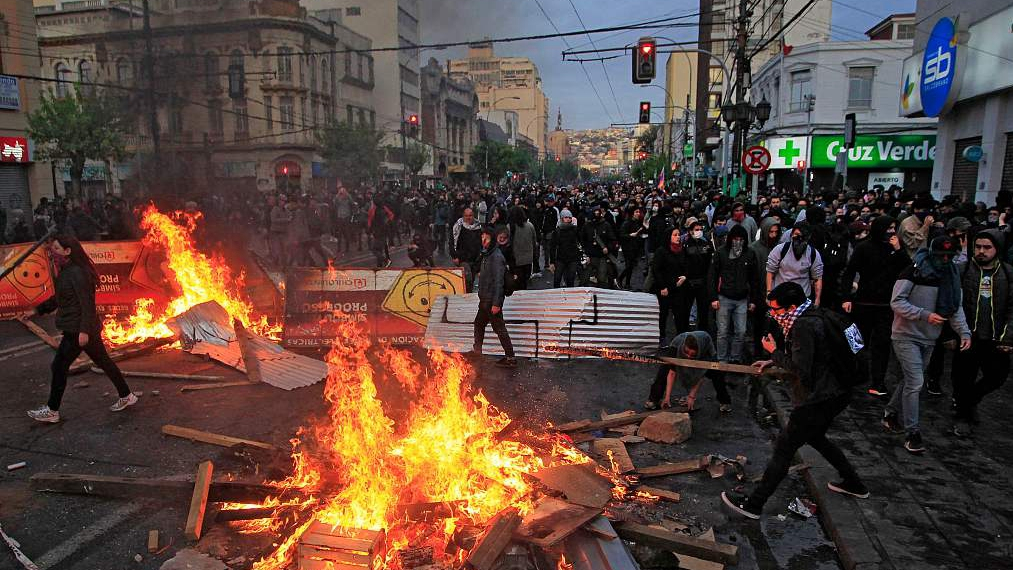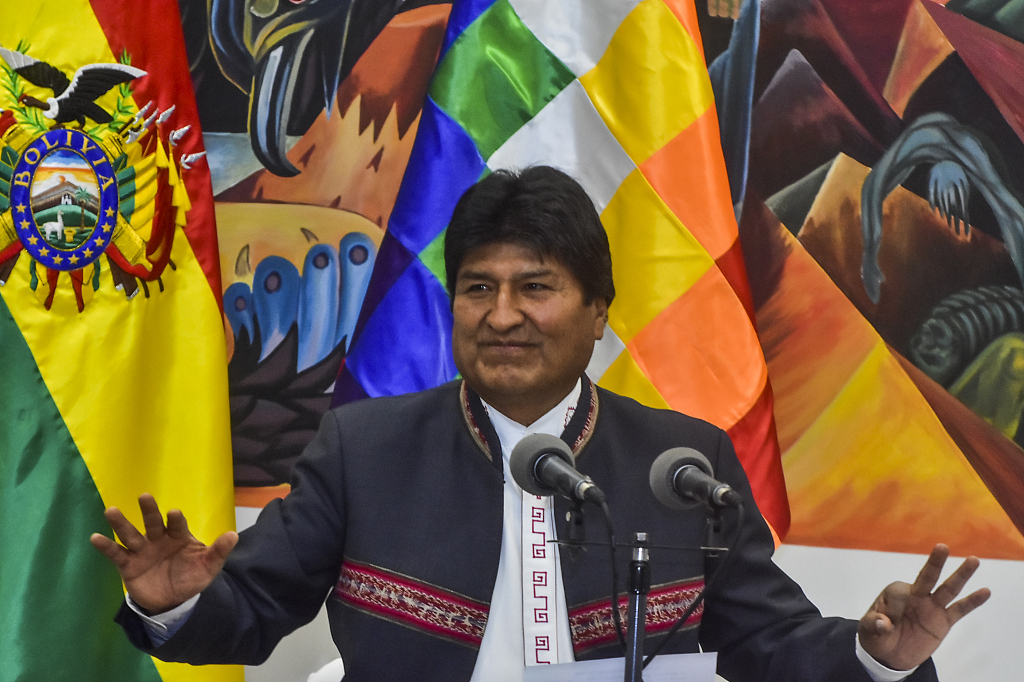
Demonstrators lighting bonfires in Vaparaiso, Chile, Oct 19, 2019. /VCG Photo
Demonstrators lighting bonfires in Vaparaiso, Chile, Oct 19, 2019. /VCG Photo
Editor's Note: Guy Burton is a visiting fellow at the Middle East Center at the London School of Economics and an adjunct professor at Vesalius College, Brussels. The article reflects the author's opinions and not necessarily the views of CGTN.
Latin America has been at the forefront of the news agenda over the past month. Presidential elections in Argentina and Bolivia have shared media attention alongside images of protesters and their clashes with security forces in Chile and Ecuador.
At one level, the stories are disparate and unique, with particular explanations in each country. But at another level, there's a thread holding them together. The thread is the region's sluggish economy over the past decade and its failure to redistribute the wealth to wider society.
Latin America's economic downturn is in stark contrast to the decade after 2000, which was a boom time, powered by commodities like oil, gas, minerals and agricultural products.
Newfound wealth coincided with the election of left-wing governments across the region. They increased the size of the state, investing more in public services like education and healthcare as well as in the economy. Even the financial crisis a decade ago failed to dent Latin American optimism.
Bolivia's President Evo Morales was elected for the first time during this period in 2006. He has since been re-elected three more times. But his most recent election on October 20 was undermined by the official count being halted halfway through when the figures between him and his challenger were close.
When the electoral court declared him the victor five days later, his lead had jumped dramatically ahead. Since then, the opposition has claimed they were cheated of victory. With nearly half the country against him, Morales is claiming they are threatening a coup against him.

Bolivia's President Evo Morales speaks during a press conference, La Paz, Bolivia, Oct 24, 2019. /VCG Photo
Bolivia's President Evo Morales speaks during a press conference, La Paz, Bolivia, Oct 24, 2019. /VCG Photo
At least Morales won. In Argentina, President Mauricio Macri lost last Sunday. His failure was to restart the Argentine economy to support the country's large public expenditure after being elected four years ago.
Opting to borrow and draw down spending incrementally, his plan was destroyed when a run on the peso last year forced him to seek a massive bailout of 57 billion U.S. dollars from the International Monetary Fund (IMF).
With inflation in Argentina currently at 54 percent, Macri lost to Alberto Fernandez, whose running mate for vice president is Cristina Fernandez de Kirchner. As president between 2007 and 2015, she oversaw the halcyon days when the Argentine economy thrived and adding to public spending.
Neither Morales nor Fernandez are likely to face a promising future economically. Across the region commodity prices have fallen. As the principal engine of global economic growth, Latin America was vulnerable.
The economic slowdown explains the protests now in Chile and Ecuador. For the past two weeks, Chileans have demonstrated against the cost of living. On Friday, October 25, one million marched in the capital Santiago. The Chilean protests have followed similar disorder that has swept Ecuador. There, President Lenin Moreno sought to introduce austerity measures as part of a restructuring package with the IMF. Among the cuts are ending fuel subsidies.
Although the government proposed to amalgamate other benefits, the loss of gasoline and diesel subsidies hit the poorest the hardest, in a country where national income has fallen by 4 percent between 2014 and 2018. It was a trigger for two weeks of violent protests and looting which also saw Moreno's government having to be evacuated from the capital Quito.
Finally, just as politicians face an unpromising economic future, so too do protesters face a bleak political landscape.

A demonstrator hits an armored vehicle with a stick, Quito, Ecuador, October 9, 2019. /VCG Photo
A demonstrator hits an armored vehicle with a stick, Quito, Ecuador, October 9, 2019. /VCG Photo
The examples of Venezuela and Brazil are stark here. Under its late and charismatic leader, Hugo Chavez, Venezuela rode rising oil prices after 2000. He used much of that wealth to build public services, subsidize public goods and nationalize local businesses. But the fall in oil prices after 2014, along with mismanagement in the public sector and rationing has led to difficulties, including mass emigration and growing authoritarianism by Chavez's successors to keep control.
Similarly, Brazil experienced a severe economic crunch in the middle of the current decade. But already there were signs of public discontent: Like Chile today, protests against public transport fare rises in 2013 led to nationwide protests against the then-government in Brazil.
Beginning in 2014, judicial investigations uncovered a massive corruption scandal in which businesses had made big donations to politicians in exchange for public contracts. Although Rousseff was charged on an unrelated matter, the scandal swept up Brazilian politics and enabled a relative outsider, the far-right Jair Bolsonaro, to win the presidential election last year.
Bolsonaro won by saying that he was going to clean up the system. But less than a year since taking office he and members of his family are alleged to be caught up in corruption scandals themselves, including receiving payments from vigilante groups who are also believed to be behind the assassination of a prominent city councilor in Rio de Janeiro last year.
In sum then, whereas Latin America entered the present decade in a positive state, it is leaving it in a sorrier state. Indeed, for both politicians and protesters, the situation in Latin America is likely to get a lot worse before it begins to improve.
(If you want to contribute and have specific expertise, please contact us at opinions@cgtn.com.)